Featured Pamphlets
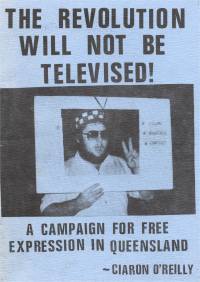 The Revolution will not be Televised!
A Campaign for Free Expression in Queensland (1982-1983) ....Ciaron O'Reilly
The Revolution will not be Televised!
A Campaign for Free Expression in Queensland (1982-1983) ....Ciaron O'Reilly
The successful Free Speech campaign in Brisbane during 1982 and 1983 is well documented in this pamphlet by Ciaron O'Reilly. Since the late 1960's Brisbane has had an active and diverse number of anarchist and libertarian groups, which have been prominent in all protest movements and local campaigns.
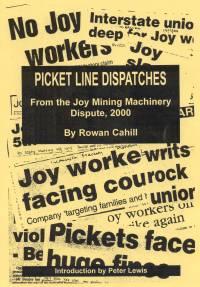 Picket Line Despatches from the Joy Mining Machinery Dispute, 2000....Rowan Cahill
Picket Line Despatches from the Joy Mining Machinery Dispute, 2000....Rowan Cahill
Rowan Cahill's pamphlet is an important chronicle of this dispute, which highlighted the neo-liberal agenda for attacking workers, their conditions, and union organisation.
The Joy dispute is a reminder that ‘old’ trade union notions of struggle, and traditional approaches to organisation and mobilisation, are relevant modern industrial responses. - Rowan Cahill
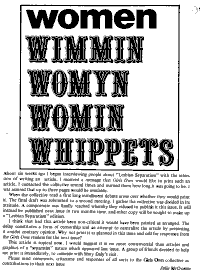 On Lesbian Separatism - Women wimmin womyn womin whippets....Julie McCrossin
On Lesbian Separatism - Women wimmin womyn womin whippets....Julie McCrossin
Julie McCrossin's pamphlet challenges the tenets of lesbian seperatist ideas in the women's movement during a visit by Mary Daly to Sydney in the early 1980's. Julie McCrossin in the late 90's has earned fame as part of the panel in the satirical comedy television program Good News Week.
 What is this Gay Community Shit? - The Sydney Gay Mardi Gras and the Left....Sasha Soldatow
What is this Gay Community Shit? - The Sydney Gay Mardi Gras and the Left....Sasha Soldatow
Sasha Soldatow presents the early history of Sydney's Gay Mardi Gras. In doing so he illuminates the sellout by the 'Gay Left' to gay captalism. New Introduction - March 2001
"...the emerging gay community was dismantling a whole history of radical political action..... Simply put, the whole gay community thing was twaddle; it was a matter of emerging gay capitalists smelling the dollars that could be milked from men's cocks."
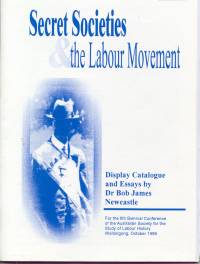 Secret Societies and the Labour Movement....Dr Bob James
Secret Societies and the Labour Movement....Dr Bob James
Contains two essays published for the 6th Biennial conference of the Australian Society for the Study of Labour History, held in Wollongong, October 1999. In conjunction with the conference Bob James organised a display of historic photographs of banners, certificates, as well as stand up figures and regalia he has collected in his researches. These essays are of value to anyone interested in the origins of trade unions and working peoples organisations. As Bob James sums up in the last paragraph: All lodges, today, are in decline, and the loss of membership of 'trade unions' is just one part of that. At a time when Australian mateship is being denigrated and generational dysfunction is widespread, there is little awareness of what used to tie communities together, what 'solidarity' can mean or how the 'labour movement' built itself in the first place.
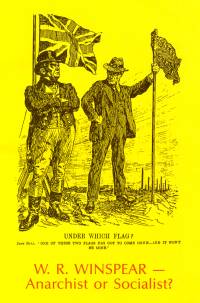 W.R. Winspear - Anarchist or Socialist? - An appraisal of a pivotal figure in Australian labour and radical movements of the 1880's and early twentieth century. In this essay Bob James clears some of the historical misconceptions and inaccuracies about Winspear's politics. Winspear published Australia's first regular radical socialist newspaper - The Radical, later renamed The Australian Radical.
W.R. Winspear - Anarchist or Socialist? - An appraisal of a pivotal figure in Australian labour and radical movements of the 1880's and early twentieth century. In this essay Bob James clears some of the historical misconceptions and inaccuracies about Winspear's politics. Winspear published Australia's first regular radical socialist newspaper - The Radical, later renamed The Australian Radical.
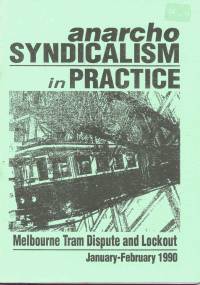 The Melbourne Tram Dispute and Lockout of 1990.....Dick Curlewis.
The Melbourne Tram Dispute and Lockout of 1990.....Dick Curlewis.
The 1990 tramways dispute is one of many industrial disputes in which rank and file unionists displayed the courage and daring to take control of their working situation. Workers Control raised its head for week or two. In this dispute, like many others, the union bosses sold out their members, through a deal done with the State Labor government. But the real story is how a small group of militants succeeded for a few years in setting the agenda amoung rank and file workers in the public transport industry in Melbourne.
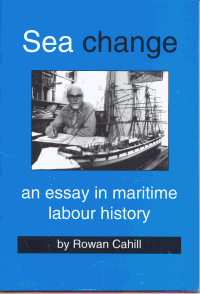 Rowan Cahill's essay - Seachange: An essay on Maritime History on Seaman's Union Official - Eliot V Elliott (1902-1984) - brings to light one of the largely unsung heros of the Australian labour movement. Elliott, as Federal Secretary of his union for 37 years (1941-1978), steered the Seamen's Union of Australia through the difficult changes in technological development in seafaring during the post war decades of the twentieth century. He was both forward looking and dedicated to the interests of seamen and working people, in Australia and internationally.
Rowan Cahill's essay - Seachange: An essay on Maritime History on Seaman's Union Official - Eliot V Elliott (1902-1984) - brings to light one of the largely unsung heros of the Australian labour movement. Elliott, as Federal Secretary of his union for 37 years (1941-1978), steered the Seamen's Union of Australia through the difficult changes in technological development in seafaring during the post war decades of the twentieth century. He was both forward looking and dedicated to the interests of seamen and working people, in Australia and internationally.








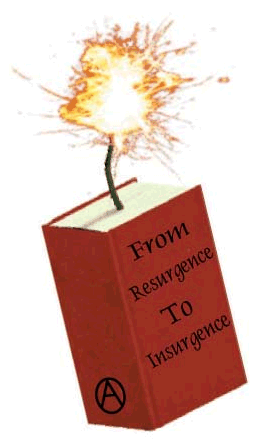
 The Revolution will not be Televised!
A Campaign for Free Expression in Queensland (1982-1983) ....Ciaron O'Reilly
The Revolution will not be Televised!
A Campaign for Free Expression in Queensland (1982-1983) ....Ciaron O'Reilly